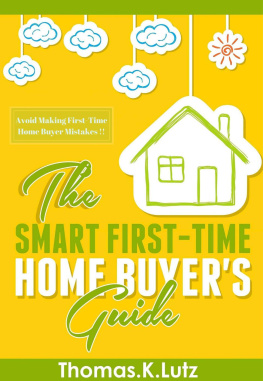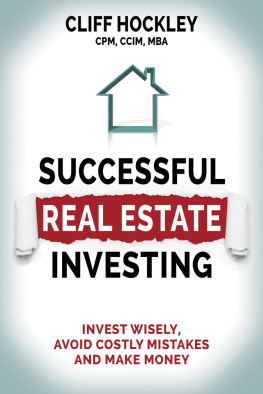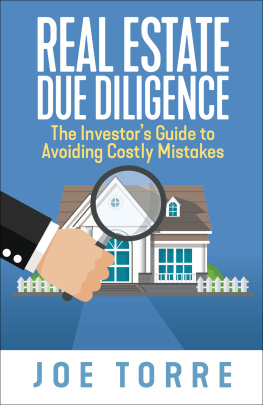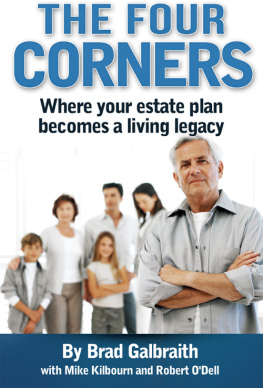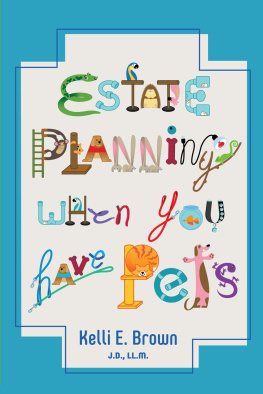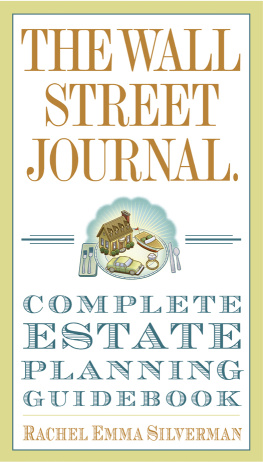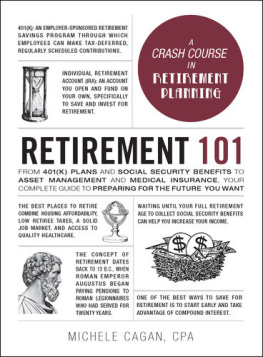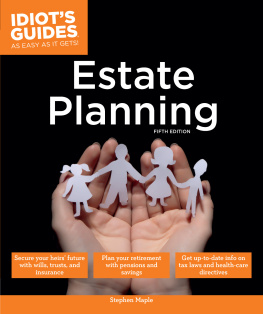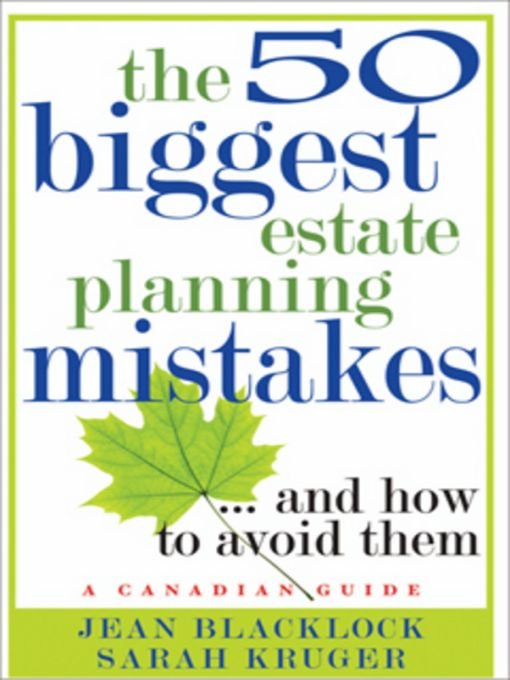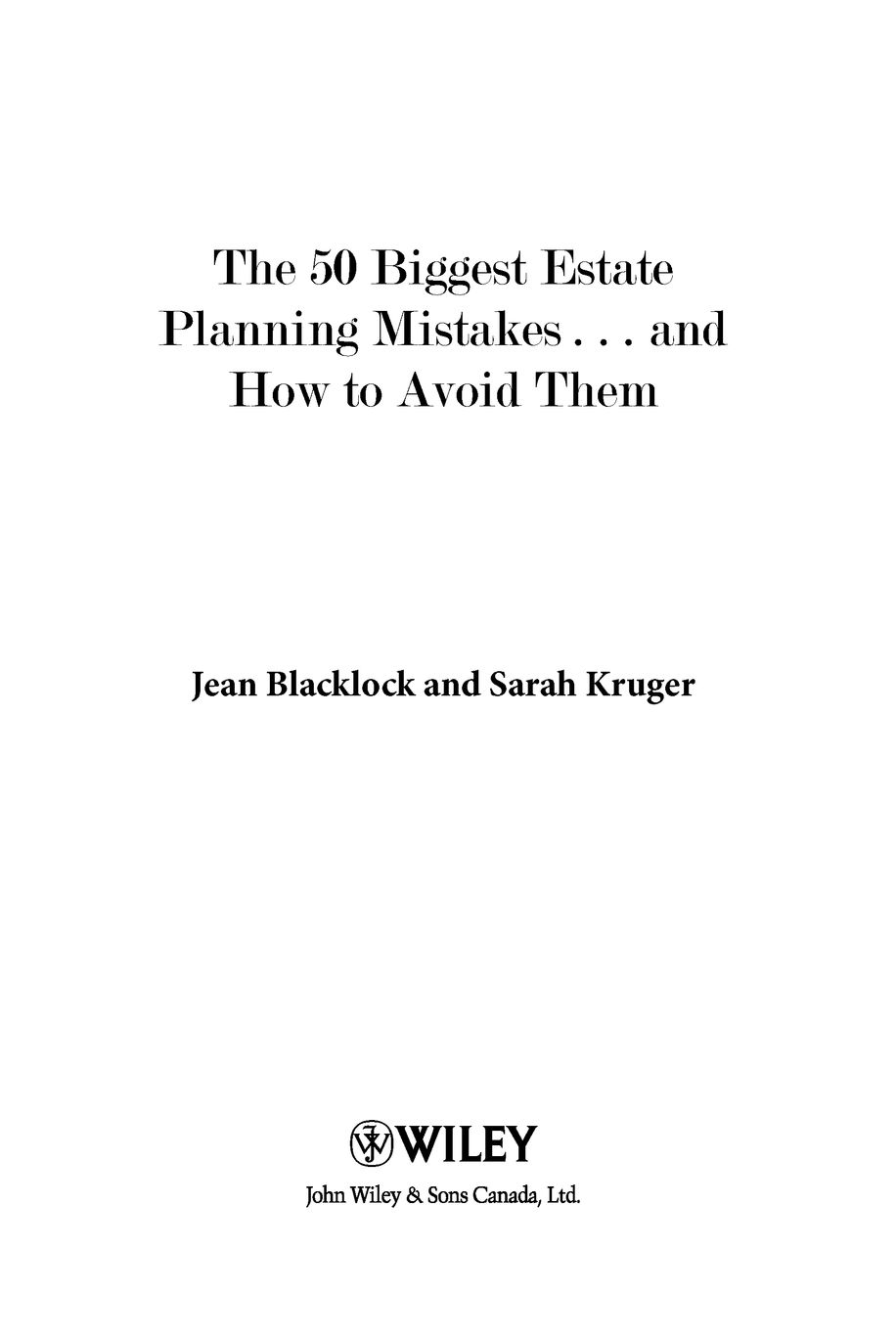Table of Contents
To Jock Blacklock and the late Mabel Blacklock, my amazing parents, with all my love. Two of your hallmark characteristics were responsibility and candor: you had wills and talked about them openly around the kitchen table as far back as I can remember. I thought about you both so much as I wrote this book.
JEAN
To my Dearest Aunt, Deirdre Romanes, who passed away during the writing of this book, with love. You will always be the bravest, strongest, most graceful and accomplished woman I have ever known.
SARAH
PREFACE
THE IDEA FOR The 50 Biggest Estate Planning Mistakes and How to Avoid Them first occurred to Jean when she was practising estate law. It seemed to her then that the mistakes people make in estate planning are most often not because of some technical blooper or the oversight of an esoteric area of the law. Usually if people are doing complicated estate planning, they retain good professional help and all the provisions of the Income Tax Act are complied with, all the ts crossed and the is dotted.
Instead, the mistakes that are made most often tend to be simple missteps or faulty assumptions, like thinking that the adult kids and spouses will magically get along after their parents deaths, even though they dont really get along now, or being wilfully blind to the importance of specifying who will receive each piece of artwork. These types of common errors are not too glamorous, exciting or even necessarily of great monetary importance, but they can lead to months or even years of acrimony.
Jeans and Sarahs paths crossed during their time in financial services, at a point where Jean was responsible for wealth services and personal trusts at one of Canadas major banks and Sarah was working on a number of projects in the banks wealth services area, requiring intensive interviews of Canadian and American families who were going through the succession-planning process. Jeans background and her interest in making complicated topics simple, and Sarahs ability to interview a wide range of subject matter experts, came together to enable them to write this book with the following objectives in mind: A book that would be fun and interesting to read, packed with useful tips and ideas from a swath of well-informed professionals whose work touches, one way or another, the professions of estate planning and estate administration.
The 50 Biggest Estate Planning Mistakes and How to Avoid Them falls into four sections. The first section contains the 7 Mistakes in planning for the possibility of mental incompetency; the second section discusses the 6 Mistakes that arise when no planning for death is done at all; the third section includes the 26 Mistakes that commonly happen when we do get around to our will planning; and the final section covers the 11 Mistakes that people make in the course of administering a deceased persons estate. A glossary at the back of the book defines terms that may be unfamiliar.
major themes
As we wrote the book, we were often asked by our family or friends,
So, what is the
biggest mistake? It is hard to even narrow it down to a Top 10 list, but we
can say that most of the 50 Mistakes contain one of three themes:
1. procrastinating;
2. not taking the estate-planning process seriously enough; and
3. underestimating a possible problem and overestimating the people we love.
Procrastinating about estate planning is something a lot of people recognize in themselves, whether its about preparing a first will or updating a later one. Planning for the possibility of our mental incompetency or the eventual certainty of our death is a tough and, at times, emotional process, which makes a trip to the dentist feel like a Caribbean vacation.
So, inevitably, some of the 50 Biggest Mistakes are about not getting important tasks done, not only the key documents such as powers of attorney for personal care (sometimes called personal or advance directives), powers of attorney for property, and wills, but also the organization of all our other papers in a manner that would be incredibly helpful to our executor when we die.
The second common thread throughout the mistakes is about not taking estate planning seriously. Mistake #14 is called Is That Snoring We Hear? and it discusses the phenomenon of people working on their estate planning mainly as a to-do item on the list, something to be stroked off the list like redoing the roof.
Although getting to the job can take some time (see above comments on procrastination!), once in the thick of it, people can err by pretending that this really wont be the last will. This attitude means that all those depressing questions about who gets what when are answered in a perfunctory way and it often results in mechanical reading and minimal comprehension of the draft documents prepared by the lawyer. Why? Because we delude ourselves into thinking that we will be doing another will in a few years and we promise ourselves to devote greater care and attention to it then. You can see where this attitude gets us: dying with a will that causes our loved ones to say, Really?? She really wanted that?
Underestimating problems and overestimating the people we love is the third theme in the estate-related mistakes people make. People joke about mothers and fathers who can only see the good in their children and it is wonderful in life to have that unconditional and unfettered love that only parents give us. Having said that, when it comes to passing on the family cottage, leaving large sums of money with no strings attached, or putting our assets into joint names with only one of our children, mistakes happen, creating situations we never intended or imagined.
Mistake #31 is called Thats Not a Mosquito, Thats Your Sister-in-Law, bringing to mind the exasperation we heard from many estate professionals as they reflected how there really are very few, if any, fail-proof ways to transfer the cottage from one generation to another. This difficulty is not about the legal or tax technicalitiesthose can be planned forit is about the challenge of an expanding family over the years being able to work through individual foibles and interpersonal strife to achieve harmony in the usage of a single property, often laden with years of emotions.
Clearly, parents in doing their estate planning can underestimate the potential pitfalls throughout their overall estate plan, and at the same time overestimate the ability of the family to work it out together after Mom and Dad are gone.
a note about quebec
Although The 50 Biggest Estate Planning Mistakes and How to Avoid Them is not intended to be a technical book, it is based on Canadian law across the common law provinces and territories. In Quebec, the Quebec Civil Code provides much of the legal framework relating to estates, successions and trusts. While many of the general principles are the same as those in the common law provinces, the law in Quebec as it pertains to our topics of incompetency, wills, estates and trusts is different than in the rest of Canada and, for this reason, readers in Quebec will want to keep that cautionary note in mind.
Some topics covered in the book are relevant regardless of whether the common law or a civil code applies, coming from the anecdotes of trust and estate professionals in every province. These include keeping your estate planning current throughout the stages of your life, different ways to approach the treatment of personal effects, getting organized as an executor, and communicating effectively with the estate beneficiaries. Topics such as these will be relevant to readers anywhere in Canada, including Quebec. Just keep in mind that our references to provincial legislation do not include the legislation in Quebec, due to its significant differences.


